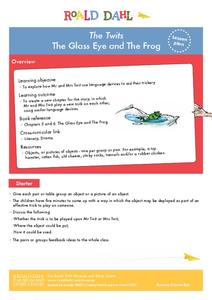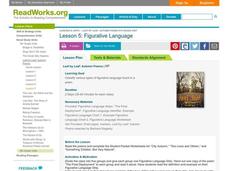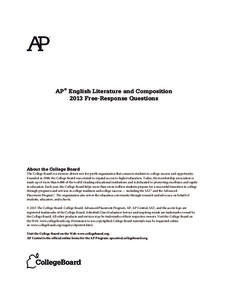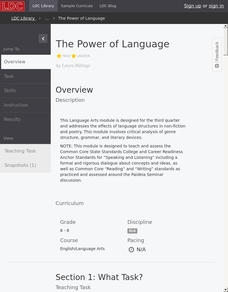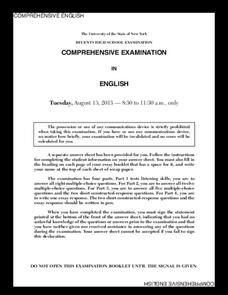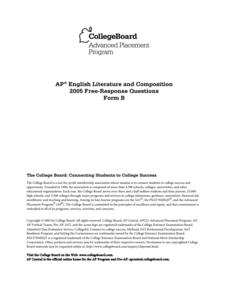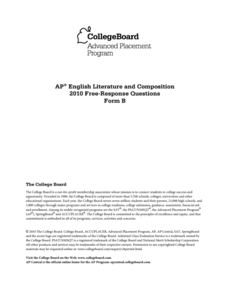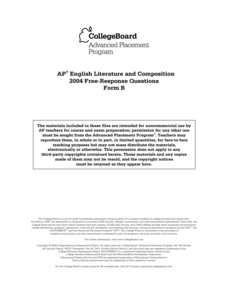K12 Reader
Storytelling and Folklore
Stories are passed down orally in many cultures. Learn about the ways that storytelling can shape a society with a reading passage about Native American folklore and myths. After they finish reading, kids complete five reading...
Curated OER
Whom, Who, and Whose
Who can tell the difference? Teach your class how to use who, whom, and whose - once and for all! One page provides an easy-to-understand instruction sheet, and the second page prompts learners to practice their grammar with thirteen...
August House
The Clever Monkey Rides Again
Use a West African folktale to practice several different skills in your first grade classroom. Learners read The Clever Monkey Rides Again and focus on rhyming words, reading comprehension, measurement, art, movement, and word order.
K12 Reader
What is a Tribal Government?
What is life like on a Native American reservation? Learn about the ways a tribal government works with a reading comprehension activity. After reading a short passage, kids use context clues to answer five comprehension questions.
Curated OER
Creating a Newspaper
Get the scoop with a fun, engaging newspaper project. After analyzing the parts of a newspaper, including the headline, subtitles, and pictures or images, young journalists get to work by writing their own stories in a newspaper article...
Roald Dahl
Matilda - Miss Honey and The Trunchbull
As the instructor reads aloud several quotes from five chapters of the story Matilda, class members mime their interpretation of the scenes. Then, after reading "Miss Honey" and "The Trenchbull" (chapters seven and eight), the class...
EngageNY
Analyzing Point of View and Figurative Language: Chapter 1
Check out the view! Scholars complete a graphic organizer to analyze how Laurence Yep develops a character's point of view in Dragonwings. Additionally, pupils re-read parts of the novel and annotate the text on sticky notes, looking for...
EngageNY
End of Unit Assessment: Finding Evidence of Laurence Yep’s Perspective on Being Chinese in Dragonwings and Determining Connotative Language
There's a fine line between reality and fiction. As an end-of-unit assessment, scholars complete worksheets to analyze how Laurence Yep's perspective on being Chinese factors into his novel Dragonwings. Next, pupils engage in a class...
J. Paul Getty Trust
Looking and Learning in the Art Museum — Lesson 1
To prepare for a field trip to a local art museum, art class members journal their initial reactions to a reproduction of the work they will focus on during their visit. The whole class then considers the artistic elements in the piece...
Roald Dahl
The Twits - The Glass Eye and the Frog
What do a pair of stinky socks and a toy hamster have in common? The third lesson in an 11-part unit designed to accompany The Twits by Roald Dahl uses silly objects to teach about figurative language. Zany pranks and role play make for...
Curated OER
Figurative Language: Part Two
Help your young writers make their writing more descriptive and exciting in this figurative language lesson. Middle schoolers review their figurative language examples from Part One (linked to this lesson), and then write a paragraph for...
Read Works
Figurative Language
Do your learners need to practice identifying figurative language? This lesson outlines a method for working on that tricky skill. After teacher modeling and think-aloud, fourth and fifth graders identify examples of figurative language...
Read Works
The Language of Setting
Descriptive language can be used to create a vivid and imaginative setting. Create the chart suggested in this plan to track the descriptive language found in The Wizard of Oz by L. Frank Baum. The class discusses the land beyond...
Curated OER
English Lesson Plans for Grade 7
Discuss the correct use of certain phrases such as "managed" and "could" in this English instructional activity. Middle schoolers listen to interviews on work customs in different countries and compare them. They make inferences after...
College Board
2002 AP® English Literature and Composition Free-Response Questions Form B
Is there a secret to keeping secrets? Scholars choose a character in a novel or play and analyze how the character keeps a secret. Writers also craft essays to reveal elements of poetry and the use of language in a passage. The prompts...
College Board
2006 AP® English Literature and Composition Free-Response Questions
Scholars select a novel or play and then craft an essay that describes the setting's role in the story. Pupils also create essays that analyze a poet's use of language and the values of characters in a novel excerpt.
College Board
2013 AP® English Literature and Composition Free-Response Questions
Is there a moment that changed your life? Readers analyze novels and plays to discover the moments in which characters change from children to men. Writers also create essays to analyze literary devices used in The Rainbow and figurative...
Literacy Design Collaborative
The Power of Language
There is power in words. Readers take a close look at three text to determine how language structures affect meaning, including include poems and recipes. Scholars analyze the language authors use by circling important words, underlining...
Schools United to Provide Enhanced Resources Network
AP English Project: Journal of Literary Terms and Devices
To prepare for the AP English exams, individuals are asked to create a notebook of literary terms and devices. The terms must be defined, accompanied by representative artwork, and illustrated by an example drawn for a named source. A...
New York State Education Department
Comprehensive English Examination: August 2013
Individuals exercise their minds by taking the Comprehensive Examination in English, which assesses listening and reading comprehension and writing aptitude. Scholars answer multiple-choice questions and write two short-response essays....
College Board
2005 AP® English Literature and Composition Free-Response Questions Form B
Does more power make you more important? Test takers ponder the question as the 2005 AP® English Literature and Composition Free-Response Questions Form B asks scholars to take a close look at power by writing thoughtful essays. Writers...
College Board
2010 AP® English Literature and Composition Free-Response Questions Form B
Home is where the heart is. The 2010 AP® English Literature and Composition Free-Response Questions Form B require scholars to think about what home really is. They look at how a character leaves home, yet home remains within the...
College Board
2004 AP® English Literature and Composition Free-Response Questions Form B
Is there an art to dying? Scholars write essays describing how a death scene contributes to a novel or play. They also write essays analyzing poetic techniques an author uses and literary elements they see in a passage. Writers create...
College Board
2007 AP® English Literature and Composition Free-Response Questions
Scholars use the 2007 AP® English Literature and Composition Free-Response Questions to write essays examining how a character's tie to the past affects the story. The resource also requires pupils to write essays comparing two related...
Other popular searches
- English Language Arts Exam
- English Language Arts Games
- Deaf English Language Arts
- English Language Arts Music
- English Language Arts Heroes
- English Language Arts Skills
- Language Arts English
- English Language Arts Grade 3
- English Language Arts Poetry
- English Language Arts Rating=3
- English Language Arts Unit Sc
- Language Arts or English











